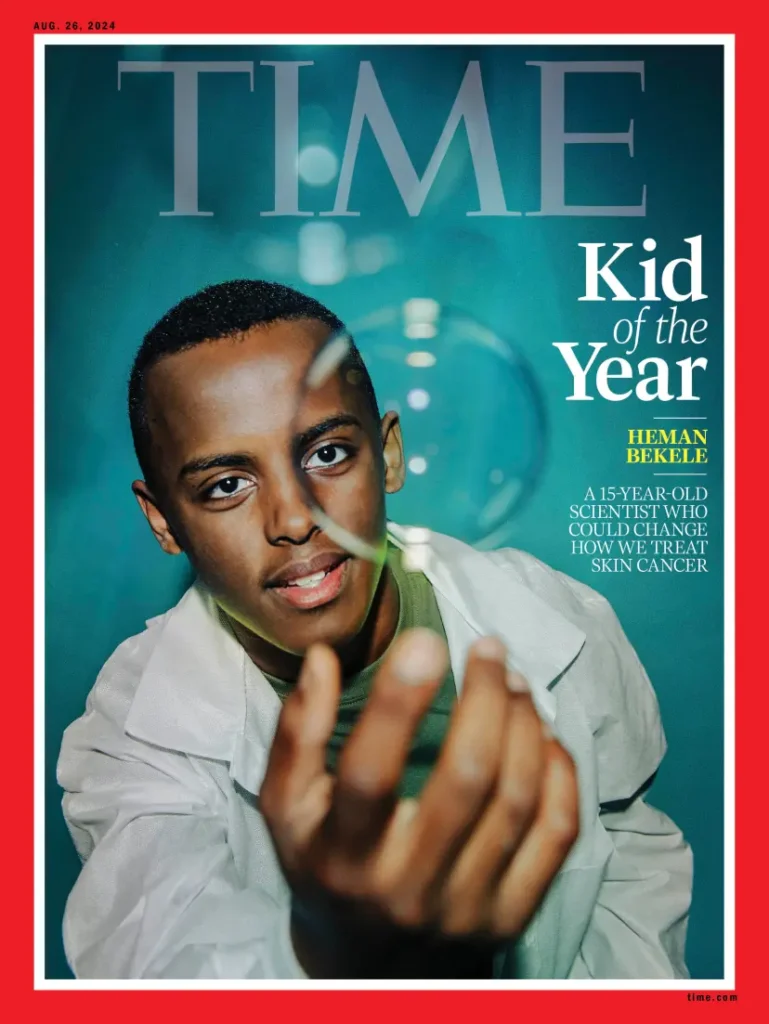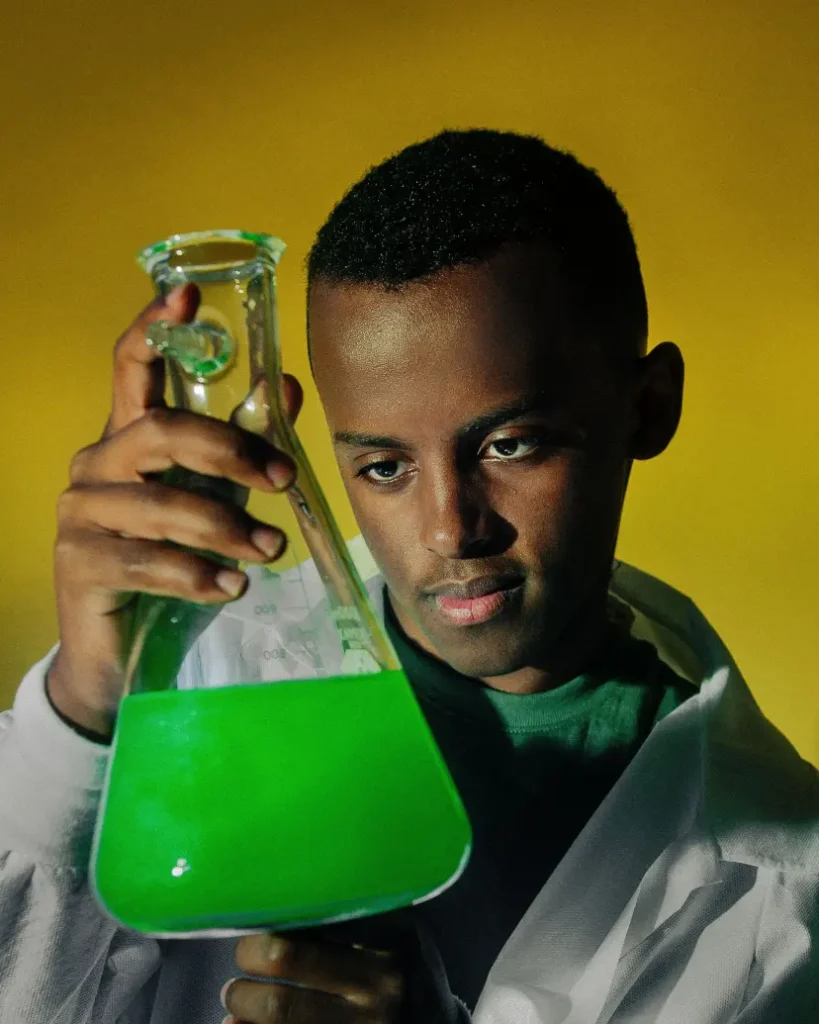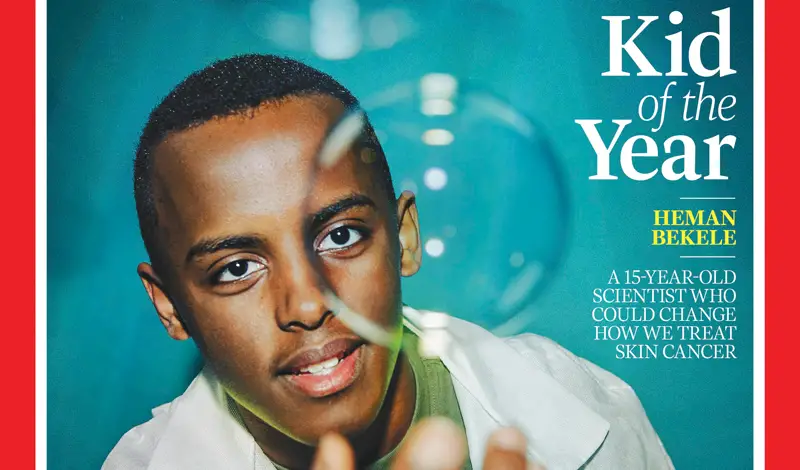When Heman Bekele was just a little over 7 years old, he started experimenting with science at home. He mixed things like dish soap, laundry detergent, and other household chemicals, just to see what would happen. He didn’t know exactly what he was doing—he just wanted to see what kind of goo he could create.
“I would hide them under my bed and leave them there overnight,” Heman remembers. “I was just mixing random things together.”
But soon, his experiments became more serious. Before his 7th birthday, Heman got a chemistry set for Christmas that included a chemical called sodium hydroxide. By then, he had already been reading about chemical reactions online. He learned that if you mix aluminum with sodium hydroxide, it can make a lot of heat. He got excited and thought, “Maybe this can help create unlimited energy!” But, things almost went wrong. “I almost started a fire,” he says.
After that, his parents paid closer attention to his experiments. Over time, Heman would get used to having adults watching him. Today, at age 15, a lot of people are paying attention to him. Last year, he won the 3M Young Scientist Challenge, a big science competition. He won a $25,000 prize for inventing a special soap that could one day help treat and even prevent different types of skin cancer. It will take years before his soap is available, but this summer, he’s working hard in a lab at Johns Hopkins University in Baltimore to make his idea a reality. Even when school starts, Heman will keep working on his project. “I’m really passionate about skin-cancer research,” he says. “It’s amazing to think that my soap could one day help save someone’s life.”
Heman’s goal of helping others is one of the reasons he’s been named TIME’s Kid of the Year for 2024.
Heman was born in Addis Ababa, Ethiopia, and moved to the United States with his family when he was 4. One of his first memories was seeing workers outside in the hot sun without sunscreen or protection for their skin. His parents taught him and his siblings—Hasset, 16, and Liya, 7—how important it was to protect their skin from the sun. They told them about the dangers of spending too much time outside without sunscreen.
“When I was younger, I didn’t think much of it,” Heman says. “But when I came to America, I realized how big a problem the sun and UV rays are for your skin if you’re out in it too long.”
After learning more about the dangers of the sun, Heman started thinking about how he could help. A few years ago, he read about a medicine called imiquimod. This medicine is used to treat skin cancer and can even help destroy tumors. Usually, it’s a cream that people apply to their skin. But Heman thought, “What if there was a way to make this medicine easier and cheaper for people to use, especially in the early stages of skin cancer?”
His idea? To put the medicine in a bar of soap. A soap would be easy to use, and it would cost much less than the expensive treatments, which can cost $40,000. Heman’s goal is to make his soap available to everyone who needs it.
Heman is working hard to make his dream come true and hopes that one day his soap will help many people live healthier lives.

“What is one thing that is an internationally impactful idea, something that everyone can use, [regardless of] socioeconomic class?” Heman recalls thinking. “Almost everyone uses soap and water for cleaning. So soap would probably be the best option.”
There was a long way to go between inspiration and application, however. Executing on his idea was more complicated than simply mixing the drug into an ordinary bar of soap, since any therapeutic power the imiquimod might confer would just be washed down the drain with the suds. The answer was to combine the soap with a lipid-based nanoparticle that would linger on the skin when the soap was washed away—much the way moisturizer or fragrance can stay behind after the suds are rinsed off.
There was only so much brainstorming Heman could do on his own, however. Then, in 2023, he came across the 3M challenge and submitted a video explaining his idea. Soon, he received an invite to the company’s HQ in St. Paul, Minn., to deliver a pitch in front of a panel of judges. Before that day was out, he’d been named the winner. The $25,000 prize, he knew, would go a long way toward helping him afford to pursue his research, but he’d still need a professional lab in which to conduct the work. That opportunity arrived in February, when he attended a networking event hosted by the Melanoma Research Alliance, in Washington, D.C. There, he met Vito Rebecca, a molecular biologist and assistant professor at Johns Hopkins in Baltimore.
“I remember reading somewhere something about this young kid who had an idea for a skin-cancer soap,” says Rebecca. “It immediately piqued my interest, because I thought, how cool, him wanting to make it accessible to the whole world. And then, by complete serendipity at this Melanoma Research Alliance meeting, the CEO of the alliance introduced me to Heman. From the first conversation, his passion was evident. When I found out he lived very nearby in Virginia, I told him if he ever wanted to stop by the lab he’d be more than welcome.”
Heman took him up on that idea, and Rebecca agreed to sponsor Heman, acting as his principal investigator and inviting him to work at the Baltimore lab, toggling between benchwork and schoolwork back in Fairfax.

For almost six months now, Heman and his research partner, Rebecca, have been conducting experiments with mice. They’ve been injecting the animals with types of skin cancer and preparing to test their special soap, which contains imiquimod, to see if it can help fight the cancer. While they’re getting ready to test the soap and compare it to a control against melanoma, Heman knows there’s still a lot of work ahead. “There’s a long way to go,” he says. Testing the soap is just the beginning. He still needs to get the soap patented and approved by the FDA, which could take up to ten years.
What’s impressive is that by the time Heman is ready to get his soap on the market, he will only be 25 years old—still younger than most medical students, who haven’t even finished their advanced studies by that age. He’s making the most of this time. Besides working on his project, Heman is also sharing his idea with others. In June, he gave a big presentation in front of 8,000 people at the Tsongas Center in Boston, during a meeting for the National Academy of Future Physicians and Medical Scientists. “It was nerve-racking,” he admits, “but it was fun.”
Heman has fun in more typical ways too. He’s a member of the Woodson High School marching band, where he plays both the flute and trombone. He loves basketball, reads a lot (especially fantasy books), and recently reread The Great Gatsby, calling it “a pretty good read.” Heman also enjoys playing chess, which he describes as a “turn-my-brain-off-and-play” kind of activity.
He credits his family, especially his parents, for inspiring his achievements. His mother, Muluemebet, is a teacher, and his father, Wondwossen, works as a human-resources specialist for the U.S. Agency for International Development. Their journey to the U.S. to give their children a better education has taught Heman the value of hard work and learning, and it’s given him the courage to chase big dreams—no matter how impossible they may seem.
Heman’s support doesn’t stop with his parents. He’s also guided by Rebecca, his partner in research, and Deborah Isabelle, his mentor from 3M, who helps him with his scientific projects. “I got really lucky,” says Deborah. “Last year was my first year as a mentor in the Young Scientist Challenge, and I was paired with Heman. He’s an amazing, passionate, and inspiring young man.”
Of course, Heman doesn’t always get everything right. Deborah has been there to help him learn from his mistakes. “One time, when he was making the soap, things didn’t go as planned,” she says. “So I asked him, ‘What didn’t work? What did you do?’ We talked about it, and he realized he hadn’t followed the directions exactly. We had a conversation, and he figured out what went wrong and what to do next. That’s how he learns.”
Heman hopes that kind of trial and error will eventually lead to the day when his soap can help treat early-stage skin cancers—like Stage 0, where there’s only a tiny growth—and later stages, where it could work alongside other treatments.
Even with all his success at just 15 years old, Heman stays humble. “Anybody could do what I did,” he says. “I just came up with an idea, worked toward it, and brought it to life.” But he also worries. With so many breakthroughs happening quickly in science and technology, he sometimes fears people might think there’s nothing new left to discover.
“A lot of people think that everything’s already been done,” he says. “But I’d tell anyone thinking that—there will always be new ideas. We’ll never run out of things to create. Just keep inventing and thinking of new ways to make the world better.”
Via: Time Magzine


